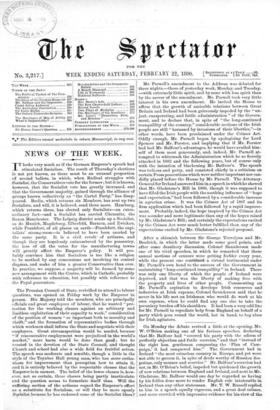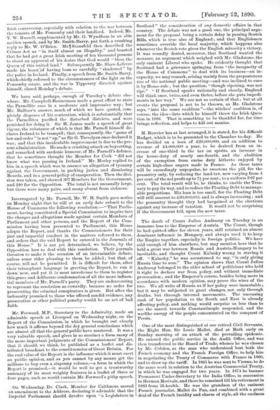On Monday the debate revived a little at the opening,
Mr. W. O'Brien making one of his furious speeches, declaring that Mr. Balfour had "covered his party with the odium of perfectly objectless and futile coercion," and that "instead of the right hon. gentleman conquering the Plan of Cam- paign,' it had conquered him." The Government had in Ireland " the most crimeless country in Europe, and yet were not able to govern it, in spite of deeds worthy of Russian des- potism, only meaner and scurvier." Mr. Balfour's coercion had not, in Mr. O'Brien's belief, impeded but quickened the growth of new relations between England and Ireland, and next to Mr. Gladstone, Mr. Balfour would one day be regarded as having by his follies done more to render English rule intolerable in Ireland than any other statesman. Mr. T. W. Russell replied to him in a speech equally vigorous, and a great deal ealmer, and more crowded with impressive evidence for his view of the
Irish controversy, especially with relation to the war between the tenants of Mr. Ponsonby and their landlord. Indeed, Mr. T. W. Russell, supplemented by Mr. G. Wyndham in an able maiden speech, and by Mr. Smith-Barry, put forth a crushing reply to Mr. W. O'Brien. MI Stansfeld then described the Crimes Act as in itself almost an illegality," and boasted that he had got a great Irish meeting of ten thousand persons to shout an approval of his desire that God would " bless the Queen of this united land." Subsequently Mr. Shaw-Lefevre made his boast :of having been so carefully " shadowed" by the police in Ireland. Finally, a speech from Mr. Smith-Barry, which chiefly referred to the circumstances of the fight on the Ponsonby estate, and the war in Tipperary directed against himself, closed Monday's debate.







































